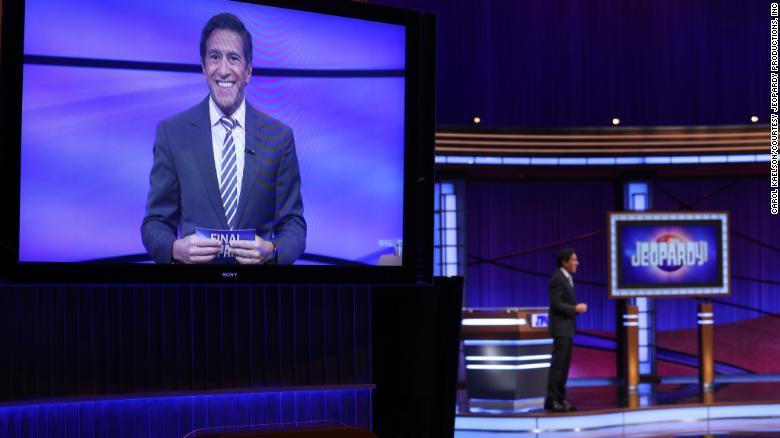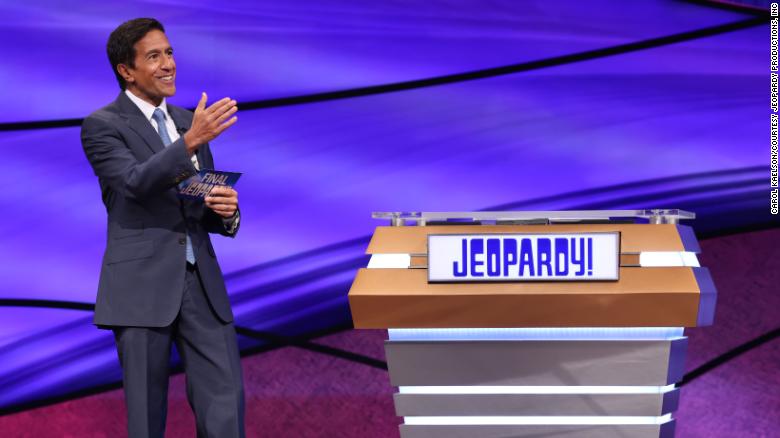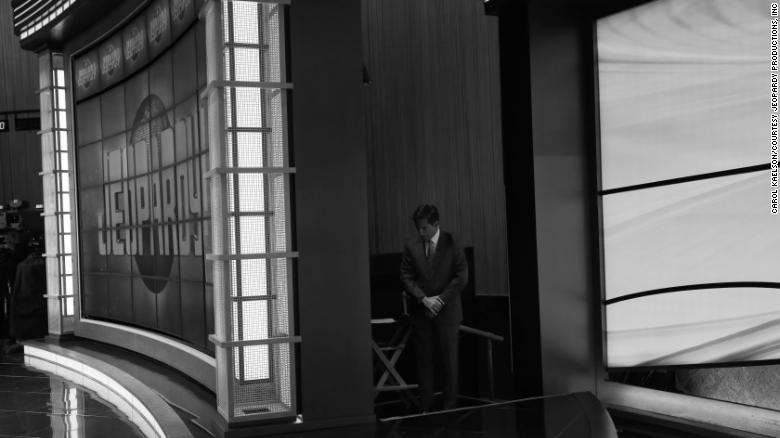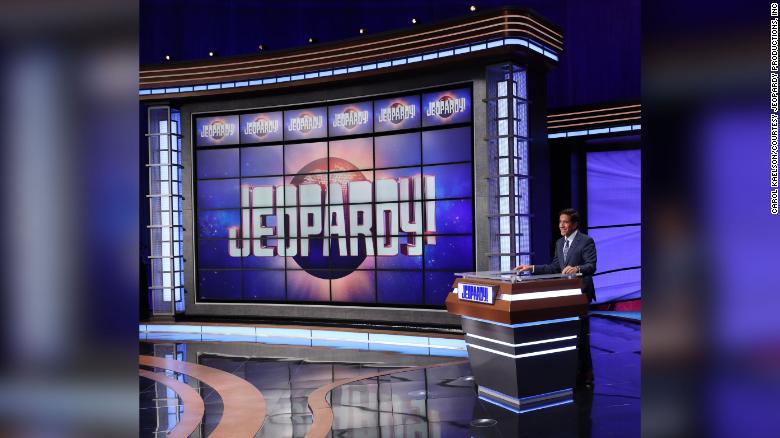For example, the show’s standards and practices team was omnipresent on set. They shared some of this history with me and also gave practical tips, reminding me to keep close tabs on any papers that contained clues, even asking that I put them in the hotel safe whenever I left the room. I wasn’t supposed to share clues with anyone, obviously, not even my spouse. While I was given multiple show scripts, I wasn’t told the order we would tape them until just before filming began. And, even after that, the order could be changed again to ensure no one had advance notice of the clues. Even the contestants themselves weren’t certain when they would be called into a new show. There was a constant and purposeful shuffling of schedules and content to maintain that sterling history of high integrity. I felt it all around me.
Every morning before we started taping, we had a writer’s meeting to go through the clues for the day. It was one of my favorite times of the day because we got to catch up a little bit, get to know each other and pore over so many interesting bits of knowledge.
The “Jeopardy!” team of producers, writers and Clue Crew is considered the very best in the business, and it was easy to see why. It is a finely tuned machine with professionals at the top of their game. Mike Richards, Lisa Broffman, Rocky Schmidt and Billy Wisse led the daily meeting that took place in an actual library!
We sat around a table surrounded by voluminous sets of biographies and bibliographies. It even had that perfect library smell. If someone wasn’t sure about a clue, one of the genius writers would run off to a row of books, pull out the appropriate text and start flipping through pages. Sure, there was someone at a computer as well, but the whole feel of the meeting was so studious and so scholarly: very “Jeopardy!”
I loved it and felt right at home.
What is: the native language of ‘Jeopardy!’?
Even the language of “Jeopardy!” is different. Yes, there is always an exclamation point after “Jeopardy!” Instead of questions and answers, it is clues and responses. You should never ask a contestant for their answer, because their response is, in fact, a question. Confusing? A little bit.
Mike Richards, the executive producer, even had a “Jeopardy!” “swear” jar for every time I asked a contestant for their “answer.” Right away, in my earpiece, I would hear his calm, patient voice. “Response.” A few seconds later, he would say, “You owe me a beer.”
I also realized I was going to need to come up with several quick options to tell a contestant they gave the correct response. I even made a list of words that I carried around on set: Yes, Good, You got it, That is correct, That’s the one, Well done, That’s right, Correct, Spot on, You betcha, That’s it, Exactly, Absolutely, Right on, Yeah baby, Bingo, Bazinga, Roger and Preach!
OK, I didn’t use all of them, but when you watch these next two weeks, you will see that I did have some fun.
What is: the difference between a journalist and a game show host?
Colleagues often asked me about the similarities between being a TV journalist and guest hosting “Jeopardy!” Truth is, there aren’t many. In much the same way that an ophthalmologist and orthopedic surgeon are both doctors, you probably wouldn’t see the eye doctor for your broken leg. The same was true for “Jeopardy!” Yes, they are both TV jobs, but they are also entirely different. I even had to unlearn some TV journalist habits to really get into the groove of the show.
For starters, I was blown away by the incredible speed at which the game is played. Even though I had watched “Jeopardy!” for decades, I never really considered the pace of the show.
I would have 61 clues to deliver for every game. Thirty for the first round, 30 more for “Double Jeopardy!” and then one “Final Jeopardy!” clue. When I did the math for a half-hour show, accounting for things like commercial breaks and interviews with the contestants, I calculated I needed recite a new clue roughly every 15 seconds. In order to accomplish that, I had to be in constant control, keeping everyone focused and moving the show along.
One more thing: The goal was to tape five shows a day. That is 305 clues. One every 15 seconds.

What are: the similarities between a surgeon and a game show host?
Surprisingly, it was my surgical training that helped me get into the right groove for “Jeopardy!” In many ways, I prepped for the guest hosting role the way I prepare for an operation, diligently reviewing not only the diagnosis and anatomy of the patient, but the space and environment where I would be performing the operation. I like to have the OR bed positioned a particular way, depending on the type of operation. The microscope should come from behind my left shoulder with a certain amount of clearance. I want the imaging screen across the table and a little to my right, so I don’t have to turn my body in another direction to see it properly.
With “Jeopardy!”, I spent hours reviewing the clues, understanding, repeating and memorizing them, but also exploring the space and feel of the set. Usually, television sets tend to be much smaller than they appear on TV, but that was not the case here. There was the enormous game board, three contestant lecterns, plasma monitors and still plenty of additional room to explore. For me, it was a sentimental experience, thinking of my parents while standing on the set I had spent so much time watching with them in my early years.
After I let it all settle in, I got busy mapping it all out. It was 12 1/2 steps from backstage to the first place I stopped on the stage. The extra half was a stutter step that landed me perfectly on the mark. It is there that I would thank the legendary Johnny Gilbert for his introduction, greet the TV audience and introduce the contestants. 1-2-3. After that it was a quick pivot to the right and three and a half steps back to position myself behind the host lectern, where I would start reading the categories.
All of that needed to take place in the first two and a half minutes.
What is: the best way to make someone say ‘What is … ‘?
According to the autobiography of the inimitable Alex Trebek — a book I highly recommend — for most of his career, he read the categories and clues off a large sheet of paper and X’d them out as the game progressed.
Nowadays, there is a large screen built into the host lectern. As each contestant calls for the specific category and dollar amount, it pops right up on the screen. If there was ever a questionable response from a contestant, I just needed to look up at the row of “Jeopardy!” judges, who were sitting just to the side, and they would quickly give me a thumbs up or down.

One of the trickiest situations to prepare for was the possibility the contestant wouldn’t respond in the form of a question. If that happens during the “Jeopardy!” round, the host still accepts the response with a reminder to “watch your phrasing.” If it happens during “Double Jeopardy!”, I was told to “stare down” the contestant until they either figured out their mistake or time ran out, at which point I would say “no” and wait for another contestant to ring in. Remarkably, it didn’t happen very often. Even under all that pressure, the contestants were consistently composed and able to keep up with not only the clues, but the intricacies and rapid pace of the game.
What is: the reason every episode looks polished?
One of the things you may have noticed is the guest host is only on camera for a few minutes throughout the entire show. At the beginning, at the end, during the contestant interviews and during those occasions when no one came up with the right response. (The host then tells everyone the correct response.) Most of the time, the TV audience sees either the board or the contestants, and as I figured out, that notable detail is one of the most critical in making the show appear seamless.
Here’s why.
Try to picture this: When I start delivering a clue for the audience, the contestants are already reading the clue off the game board. As a result, their brains are absorbing and digesting the clue much faster than I could possibly say it. In fact, most contestants aren’t listening to me as much as they are just waiting for me to stop talking — because it is at that point the board lights up and their signaling devices are activated. It is very important that I don’t throw off the pace with a clumsy read of the clue because that can throw off the board operator, which then throws off the contestants — and if someone rings in too early, they are locked out for a quarter-second, which can make all the difference. Bottom line: No one is happy.
Here is the secret. If I do butcher the reading of the clue, I can still power through the mispronunciation without trying to auto correct or do anything else to throw off the cadence of my read. And, then during the commercial break or at the end of the show, I can just read it again. Because I was not on camera during those botched reads in the first place, the TV audience will never know the difference. Problem solved.
Out of 305 clues in a single day, I was told Alex Trebek only occasionally had to reread a clue. I wasn’t nearly as proficient. One day, I had to reread every clue in a particular category. In my defense, it was a category full of 10-letter words in a foreign language. As much as I practiced the night before, I was still stymied by all the syllables.

What is: still the Gupta household’s favorite pastime?
The first day I showed up on set, it was to meet everyone and start rehearsals. While the team was entirely too kind to admit this, I think they would all agree I was pretty terrible.
My pacing was off. My language skills suddenly declined. I forgot to walk to certain parts of the set at the right time, and I repeated the cardinal sin of calling a response an answer.
As I was trying to find my rhythm, I remember Mike Richards, the executive producer, walking over to me and talking me through it. It was like a masterful coach coming to talk to his errant pitcher at the mound. I thought he might bench me, but instead he told me something I never forgot: “For the contestants who come to play, this is one of the biggest days in their lives, and when you look at someone at the end of the show and tell them they are a ‘Jeopardy!’ champion, it is like placing a gold medal around their neck.”
It was powerful. The way Mike framed it changed everything for me. I wanted to make sure I didn’t let the amazing contestants down on one of the biggest days of their lives.

That night, I practiced the moves. I ran through the paces in my hotel room over and over and over again. The bathroom became backstage and the bed was my lectern. The TV was the gameboard and the window was the audience. Once I finally nailed the mechanics, I studied the clues. I got the intonation and the stride right. Speedy, but not rushed. After all that, I finally allowed myself to really feel the incredible emotion of “Jeopardy!”
The next day, the practice paid off and the moves finally started to feel more natural. And, at the end of the show, it all clicked together. I looked at one of the contestants, smiled and said, “That makes you our ‘Jeopardy!’ champion!” The reaction was just marvelous. With hand over chest, the person started to shake, their mouth started to quiver and then break into a look of pure joy. The power of the moment was felt throughout the entire set. Everyone was smiling and crying — at the same time.
It made me realize that just because a show is full of facts and knowledge doesn’t mean it has been stripped of intensity and humanity. “Jeopardy!” is all those things.
For the next two weeks, I will be guest hosting “Jeopardy!” As you may now understand, for me, it is the honor of a lifetime.
Nowadays, I have three teenage daughters of my own and they will usually snuggle in close for that half-hour a day. We enjoy the same competitiveness and camaraderie I had with my parents. And for the first time in 16 months, my mom and dad will be coming to visit, as well. They didn’t want to miss the chance to once again celebrate knowledge, facts, data and evidence. It will be special, comforting and more important than ever.


